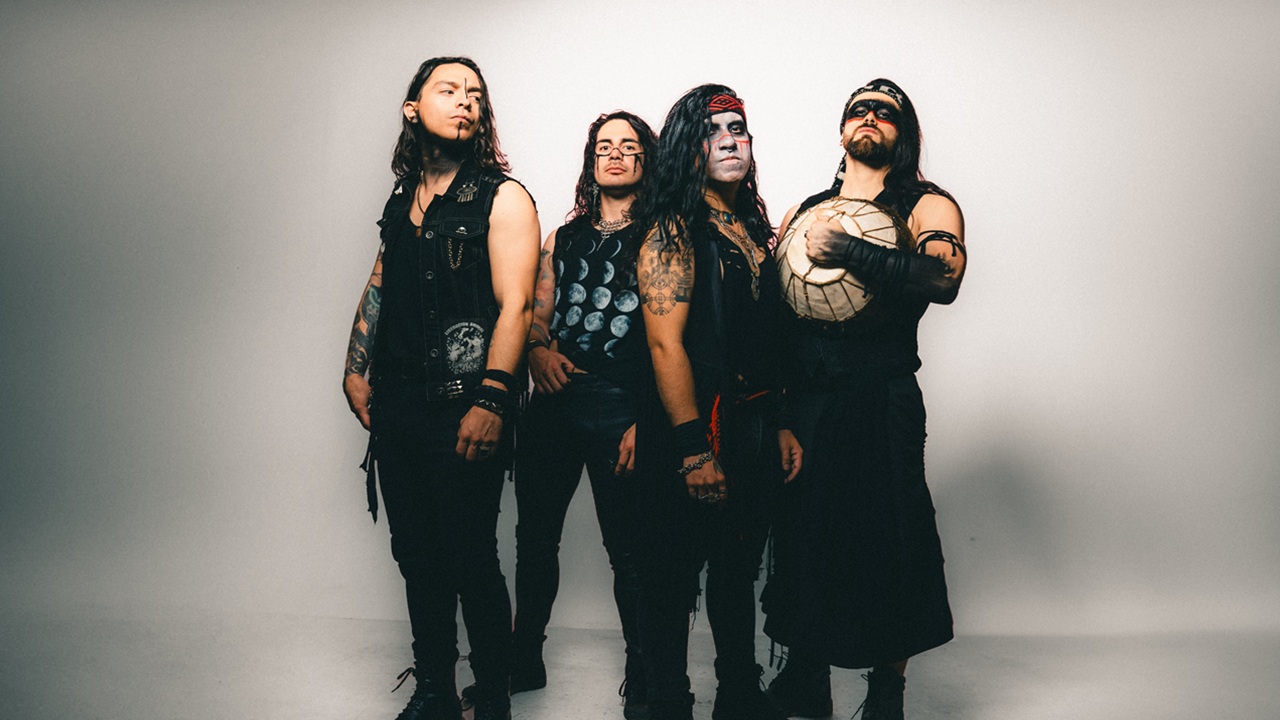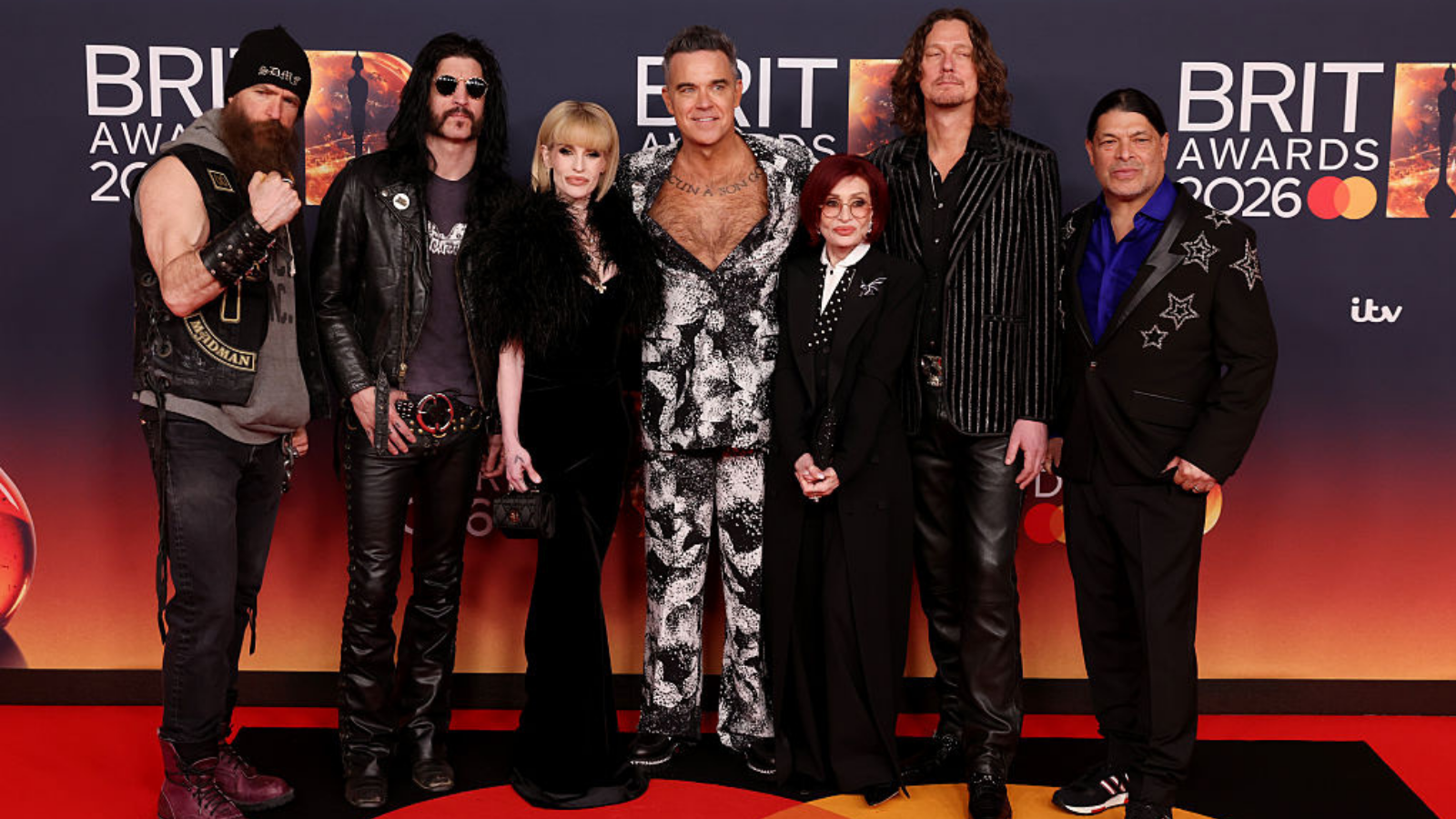“We’re Indigenous people fighting for our culture”: Endorsed by Slipknot, collaborating with Gojira and battling colonialism – how Mawiza became the most important new metal band of 2025
Mawiza’s thumping groove metal celebrates the language and traditions of South America’s Mapuche Nation

Select the newsletters you’d like to receive. Then, add your email to sign up.
You are now subscribed
Your newsletter sign-up was successful
Want to add more newsletters?
Four face-painted men stand around a bonfire, one of them banging on a South American tribal drum called a kultrung. No, this isn’t the scene of some ancient ritual – it’s the opening sequence of the music video for Wingkawnoam, a single from up-and-coming Chilean groove metallers Mawiza.
Based in Santiago and representing the Mapuche Nation, this four-piece join the rising tide of Indigenous bands introducing their cultures to metalheads worldwide. As with their peers – including Māori trio Alien Weaponry and Native American black metal project Blackbraid – they use heavy music as a megaphone to scream about their pride in their customs and their hatred of colonialism.
“We are searching for our own identity within our music,” says lead singer Awka Mondaka. “Here in Chile, for the Mapuche Nation, it’s difficult to find your identity, because in the Chilean state it’s like, ‘You are all Chilean. There is no Mapuche, there is no Indigenous, there is no identity – just Chile.’”
The Mapuche people are mainly situated in southern Chile and southwestern Argentina. For 350 years, they fought against Spanish settlers who wanted to force them into slavery and eradicate their culture. But, since Chile declared independence in 1818, their traditions have been eroded by racism and economic pressures. There are approximately 1.8 million Mapuche people in South America, yet only 250,000 speak their native language, Mapudungun.
“When the Chilean state was beginning, they cut our language,” explains Awka. “They said to our ancestors, ‘You can’t speak Mapudungun. Spanish is the language of the Chilean state. If you speak Mapudungun, you will die.’”
The effects of this oppression linger, to the point that neither Awka’s mother nor her parents spoke Mapudungun. The singer calls the language a symbol of “shame” for older generations – something he’s determined to change.
“My generation has a lot of work to do,” he admits. “We are Mapuche and we don’t feel shame, but we have to learn our language and find our own thoughts and Indigenous ways and spirit.”
Sign up below to get the latest from Metal Hammer, plus exclusive special offers, direct to your inbox!
As a result, Awka doesn’t just speak Mapudungun – he roars it. Mawiza use the language to create ethical, necksnapping songs, telling stories from their culture’s history while championing nature and sharing the beliefs of their forebears. Opening debut album Ül (‘Chant’), the song Wingkawnoam (Mapudungun for ‘to decolonise’) calls for the protection of Mapuche territory. Meanwhile, Ngulutu is about a past battle between the Mapuche and the Spanish, featuring harsh chords and sharp, scraping lead guitar.
Mawiza have the backing of some big names. They’ve played Knotfest in Chile and supported the likes of King Diamond and Gojira – frontman Joe Duplantier even screams on Ül’s closing track, Ti Inan Paw-Pawkan. Joe and Awka connected via Mawiza’s manager.
“He has a relationship with Gojira, because they played a lot in Spain, in the Basque Country [not far from Gojira’s hometown of Ondres in southwestern France], and our manager is Spanish,” explains Awka.
Initially, the hope was simply for Mawiza to support Gojira at a show in Santiago in 2023, but they ended up spending the entire day with Joe. He accompanied them to meet some of Santiago’s Mapuche community, before recording Ti Inan Paw-Pawkan in their studio, and finally having them open for his band at the concert. Awka says it wasn’t difficult to win Joe’s approval.
“We have a [common interest] with the Indigenous stuff,” he explains, referring to Gojira’s 2021 campaign Operation Amazonia, which raised money for Brazilian tribes affected by deforestation. At the end of the video for Ti Inan Paw-Pawkan, Joe praises Mawiza’s “fight and consciousness for [their] land”.
Awka grew up in Santiago, but he always felt the pull of rural landscapes. “I really loved travelling with my family to our ancestral lands,” he reflects. “When we returned to the city, I was always so triste, so sad.”
He became aware of his Indigenous heritage through a conversation he had with his mum when he was young (he thinks his dad may have been Mapuche as well, but sadly he passed away during the singer’s childhood).
“When my mother told me about my identity, she said to me, ‘We are not Chilean people,’” Awka remembers. “In my school, in my neighbourhood, in Santiago, all the people say, ‘We are all Chilean.’ We really embrace that culture. So, after my mother told me, [I wondered,] ‘What is my culture? What is my past?’ My mother gave me the seed, I think, so that when I grew up, I would find this culture.”
As Awka got older, he also found metal. His first exposure to the genre was seeing a Linkin Park music video on MTV, while Metallica was another early discovery.
“The energy of the music was so awesome to me,” he says. “These guys are screaming their thoughts, screaming their own feelings. I was quietly living in the city but, in metal and in rock, I found a way to say things with energy. Mapuche music is really high-energy, like metal, so later, this is the way I can choose [to express myself].”
In the 2010s, Awka was part of the band Nunca Seremos Dichosos (‘We Will Never Be Happy’ in Spanish), who folded Latin influences into their music. For their 2019 single, Mawiza Ñi Piwke, he sang in Mapudungun, marking the first time he had ever learnt or used the language.
“We wrote the song as an offering to the mountains: the name of the song means ‘the heart of the mountain’,” he explains. “It was important not just as a rehabilitation of Mapudungun, but also in a spiritual way. We can speak to our own land, to the spirit of the mountains and the spirit of nature. That’s a really important thing in our culture.”
The experience deepened Awka’s fascination with his heritage. He picked up more Mapudungun and began attending gatherings with local friends he’d met online.
“I found my Mapuche brothers and sisters,” the singer smiles. “Before, I could only use the internet, Googling ‘What is Mapuche?’ and ‘Mapudungun dictionary’. But, through one brother, I found Mapuche meetings. They are the new generation of Indigenous who lost their tongue and their identity. If maybe just one brother was in contact with the past, because they had a grandmother living on a reservation, then they’d have more wisdom [to share with all of us].”
Before long, Nunca Seremos Dichosos relaunched themselves as Mawiza (‘mountain’), and self-released Kollong: a compilation of their past material, but re-recorded with Mapudungun lyrics.
“With my brothers in the band, we decided, we can’t have a Spanish name,” explains Awka, “because we’re Indigenous people struggling for our own culture.”
After signing to Season Of Mist last year (home to the likes of Heilung, Cynic and Gaerea), Mawiza are expanding their vision. As well as propagating the sounds and voices of the Mapuche Nation, they hope their folk-infused music will put listeners in touch with their own roots, whatever they may be.
“The big dream for Ül is for it to move your heart,” Awka states, “because you are human too. You’re a human who has their own history with nature, because you have ancestors that were Indigenous too. The energy of your land still exists today, and this powerful thought lives in Mawiza’s music."
Ül is out now via Season Of Mist.

Louder’s resident Gojira obsessive was still at uni when he joined the team in 2017. Since then, Matt’s become a regular in Metal Hammer and Prog, at his happiest when interviewing the most forward-thinking artists heavy music can muster. He’s got bylines in The Guardian, The Telegraph, The Independent, NME and many others, too. When he’s not writing, you’ll probably find him skydiving, scuba diving or coasteering.
You must confirm your public display name before commenting
Please logout and then login again, you will then be prompted to enter your display name.

